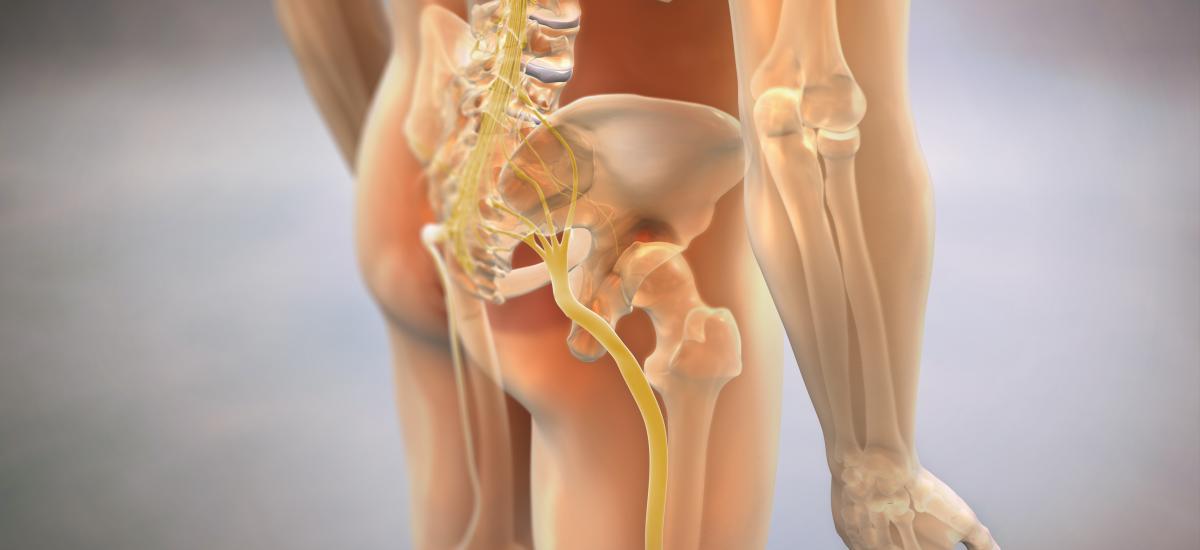In this interview, we talked to Glynn Booker, Clinic Team Leader & Tutor at the UCO Clinic, about sciatica and osteopathy.
What is sciatica?
Sciatica is when a nerve (the sciatic nerve), which runs from your low back down to your feet becomes irritated and can cause a range of symptoms. Symptoms may include pain, tingling, numbness or weakness and vary from mild to severe. Sciatica is a defined medical term, but it is often used in non-medical settings as a generic term to cover pain or symptoms in the leg.
Where is the sciatic nerve?
The sciatic nerve runs down the back of each leg, from your low back to your feet, and sciatica is a common condition that lots of people come to the UCO Clinic with.
What should I do if I think I might have sciatica?
Firstly, assessment by a professional such as an osteopath, is important. Although many patients present at the UCO Clinic and are successfully treated, it is important to ensure that the UCO Clinic is the best place for you. If sciatica is diagnosed, we work with you to develop a treatment and management plan that is best suited to you.
There are a number of things that you can do to help yourself and when you see one of our student practitioners or qualified osteopaths, they will be able to advise on the specifics of your situation.
Are there any activities that may help to ease the symptoms?
Try to continue with normal activities. Gentle movements to keep the back flexible can also be helpful.
Is there anything I should avoid?
Staying in one position for a long time is best avoided. Whilst you can sometimes get comfortable at the time, you are better to try to continue with normal gentle movements – this can help you with a speedier, more complete recovery.
What if I have tingling, numbness or weakness?
These can be part of the normal symptoms of sciatica and so are common place. At the UCO Clinic, we assess a patient’s neurological system using standard clinical tests. Your nervous system contains your nerves, including the sciatic nerve, and this means we can assess how well they are working. This may include tests such as taking your reflexes, testing whether you are able to feel things normally and whether your muscles are as strong as usual.
At the UCO Clinic, it is likely that we will perform a range of other tests and assessments and this will depend on your individual situation. For more information on what is involved when you come to the UCO Clinic, please visit the website.
Once we have conducted a full evaluation, then we will discuss a range of different options with you, which may include osteopathic treatment. If we think you might benefit from referral to your GP or another healthcare practitioner, then we would discuss that with you too.
How would an osteopath treat a patient with sciatica?
This will depend on your own situation and evaluation but will be tailored to your needs by your student osteopath or qualified osteopath. Typically, the treatments offered may include a range of hands-on techniques, advice about exercise and returning to activity, as well as suggesting ways that you can manage your pain.
We will spend time discussing what sciatica is, so that you can understand what is going on and how you can help your own recovery.
Should I go to A&E or call 999?
The NHS website suggests you should go to A&E or call 999 in the following situations:
- If you have sciatica on both sides
- If you have weakness or numbness in both legs that is severe or getting worse
- If you have numbness around or under your genitals, or around your anus
- If you find it hard to start peeing, can’t pee or can’t control when you pee – and this isn’t normal for you
- If you don’t notice when you need to poo or can’t control when you poo – and this isn’t normal for you
These could be symptoms of a serious back problem that needs to be treated in hospital as soon as possible.
There are other reasons why patients may have these symptoms, but it is important that any patient with these symptoms seek a medical opinion.
The vast majority of the people that we see at the UCO Clinic with sciatica are able to receive effective osteopathic treatment and management.

